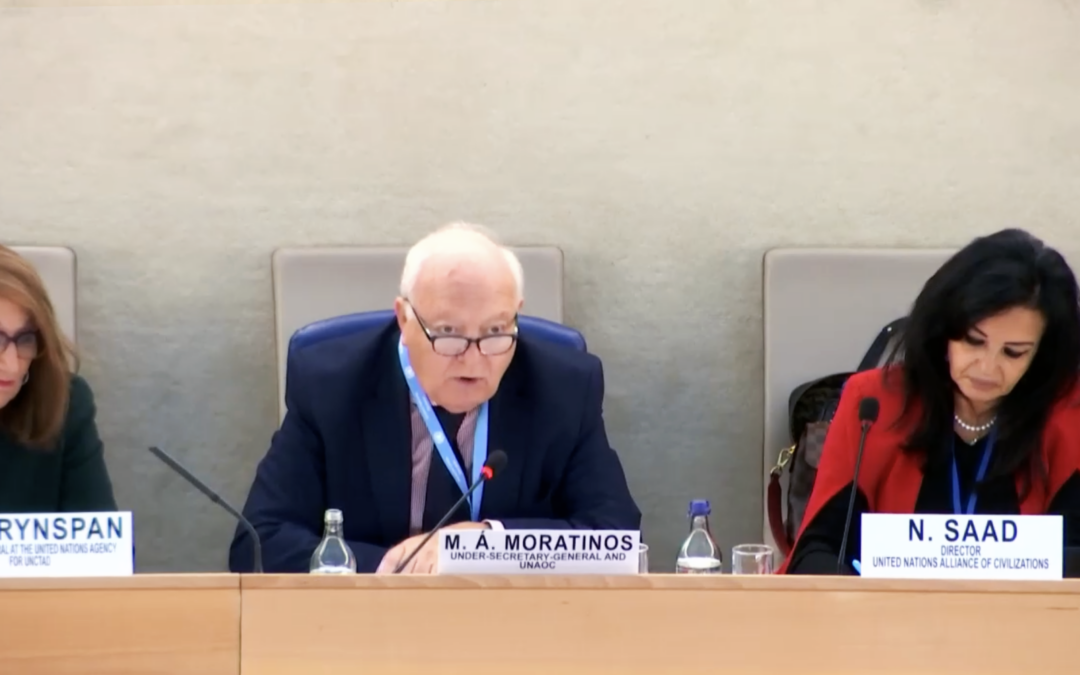Remarks by USG Miguel Moratinos
High Representative for UNAOC
at the “2nd Global Dialogue:
Towards the World of OneHumanity – The Role of Artificial Intelligence”
Friday, 20 October 2023
Human Rights and Alliance of Civilizations Room
Palais des Nations, Geneva, Switzerland
Good morning,
Excellencies,
Distinguished guests,
I warmly welcome you all for joining our second dialogue on Artificial Intelligence.
The public access of AI triggered the debate on whether AI is good and helpful or evil and dangerous?
The conversation around AI takes place not only in sophisticated tech circles but also among ordinary individuals with basic or average knowledge about advanced technologies.
The debate goes to 2 extremes : AI is either good or evil.
There is a sense that AI, if left unchecked or allowed to read lips, or mimic our voices will be in full control of our lives and will eventually lead to the downfall of humanity.
Our perception about AI is perhaps based on what we see in Science Fiction movies. I recall the 1968 Sci-Fi classic 2001: A Space Odyssey by Stanely Kubrick where AI was the villain in the movie embodied in the HAL 9000 computer .
Today, Artificial Intelligence is not a zero sub game. It is embedded in our lives and we interact with it knowingly or unknowingly. We all know Siri? Google maps?
Unlike some competitive situations where one person’s gain is offset by another’s loss, AI development can lead to benefits and enhancing the quality of our daily lives in various areas .
At the same time, while generative technology has ushered in a new era of creativity and productivity, it has also sparked contentious debate on the propagation of fake news, amplifying stereotypes, perpetuating bias, violating privacy, utilizing copyrighted content for training generative AI models, or promoting unequal representation in media narratives, to name a few.
At this important juncture in history, innovation and inclusion are crucial, and Artificial Intelligence in the service of humanity has the potential to empower diversity, respect and progress for all. However, establishing guardrails and adapting a governance framework are necessary and urgent to steer this technology towards building a better world. Moreover, a strong partnership between the public and private sectors is essential to drive the whole transformation process in harmony. This Global Dialogue will serve to deepen, amplify, and strengthen this collaboration.
Indeed, as AI continues to open infinite possibilities to aid Human Intelligence, it is of utmost importance for a multi-stakeholder, multilateral dialogue to address the potential dangers and misuse of these technologies, while simultaneously harnessing AI’s potential for positive impact.
As the Secretary-General of the United Nations stated before the Security Council that AI will have an impact on every area of our lives including the three pillars of the United Nations namely, peace and security, human rights and sustainable development.
The United Nations have taken steps to set new international rules and establish new global agencies. For example, the 2021 recommendations on Ethics of Artificial Intelligence agreed through the UNESCO; the ITU expanding on their “AI for Good programme” launched the AI for Good Neural Network designed to accelerate exchange between government and industry and to foster partnerships to achieve the SDGs and discuss AI applications for social good. We will learn more about that tool from Mr. Stephen Ibaraki , founder of UN ITU AI for Good from ITU in session VII.
Furthermore, the Secretary-General of the United Nations has announced that he will convene a multistakeholder High-Level Advisory Board for Artificial Intelligence that will report back on options for global AI governance by the end of this year.
Concluding, AI will certainly contribute to progress and improvement in the quality of our daily lives. Nonetheless, the authenticity and empathy of human interactions will always be irreplaceable.
I thank you.


